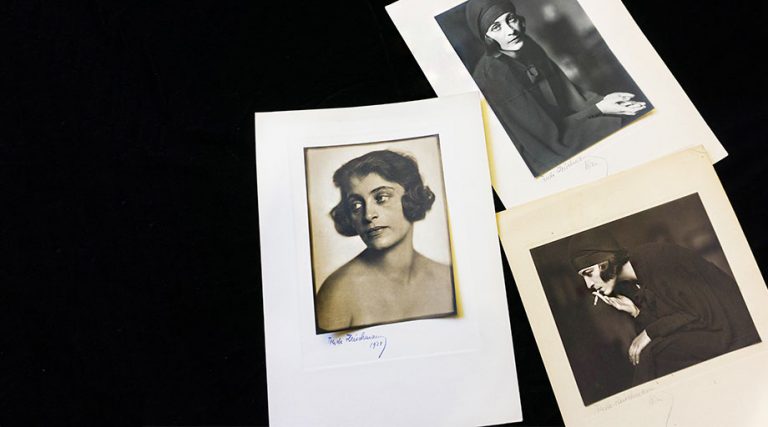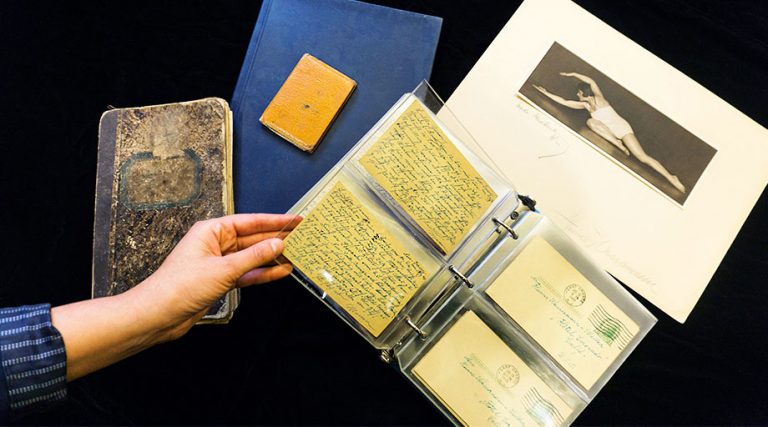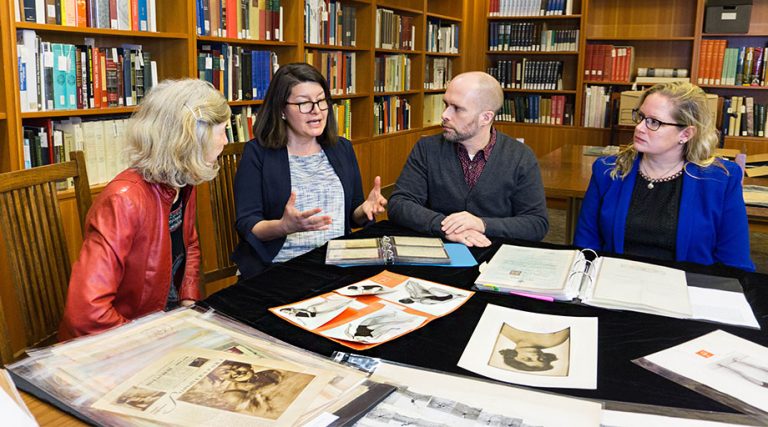UBC Library’s Rare Books & Special Collections (RBSC) has acquired the personal archive of Hanne Wassermann Walker (1893-1985), a significant figure of pre-WWII Viennese cultural and social life. Her remarkable story has been relatively unknown until now.
Born in Vienna to a Jewish family, Hanne Wassermann Walker left Nazi-occupied Austria in 1938. After living briefly in England, and then in New York, she went on to emigrate to Canada, taking up residence in Vancouver and later North Vancouver with her second husband, George Dickson Walker. She became a resident of British Columbia in 1943.
A well-known figure of Viennese society during the 1920s and 1930s, Wassermann Walker was at the forefront of the Weimar-era body culture movement. Her school of gymnastics and health manuals for women brought her international fame and recognition from reputed medical institutions and clinical specialists. Among her correspondents, friends and students were film stars, artists and members of the European aristocracy, including the Rothschild family, Lady Louis Mountbatten, Helen of Greece and Denmark and actress and wireless communications pioneer Hedy Lamarr.
UBC Library offered right of first refusal
In 1985, Hanne died without heirs, and items from her estate were acquired by a local collector. In the Fall of 2018, Katherine Kalsbeek, Head of Rare Books and Special Collections, and Krisztina Laszlo, RBSC Archivist were offered first refusal on the archive by a local bookseller. With the support of faculty from many UBC departments, Kalsbeek and Laszlo worked to identify the funds required to ensure that the archive would stay in British Columbia. “The response from both UBC and the larger community has been exceptional,” says Kalsbeek, “From numerous individual donors, to foundations, to key departments here at the university, there has been overwhelming support for our effort to ensure that Hanne’s archive stays in British Columbia.” The library saw generous support from the Azrieli Foundation, Reesa Greenberg and the Clematis Foundation, Lorne Greenberg and the Lorne Greenberg Family Partnership, Anthony von Mandl of Mission Hill Family Estate winery, the UBC President’s Office, the Faculty of Arts, the School of Kinesiology, and the Department of Central, Eastern and Northern European Studies (CENES).

Hanne Wassermann Walker as photographed by Trude Fleischmann.
The archive itself is extensive, including an impressive number of documents, correspondence, print media coverage, photographs and artifacts that span over a century.
One of the highlights is the collection of documents and photographs tracing Wassermann Walker’s life-long friendship with Trude Fleischmann, ranked among the most significant portrait-photographers of the 20th century. Not unlike Wassermann herself, Fleischmann was forced to leave Vienna during the war, to relaunch her career on the North American continent. The archive contains hundreds of photographs taken by Fleischmann during the height of Wassermann Walker’s successful career in Vienna.
A large part of the archive documents Wasserman Walker’s struggle to obtain compensation for the loss of her family’s property seized by the Nazis. The archive contains letters from lawyer Gustav Rinesch, informing Hanne of the details of her parent’s estate and his work on her and her sister’s behalf with the government of Austria.
Acquisition keeps collection together
The sheer size and breadth of the archive presents countless unique opportunities for research, teaching and learning in a number of fields from Holocaust studies, and Women’s Studies, to Kinesiology and Fine Art. Krisztina Laszlo, RBSC Archivist, notes that the acquisition of this archive “is an example of RBSC’s effort to increase our documentation of women’s role in history. Representation of women, and their successes in the life of this province, and the larger world, needs to be celebrated, preserved and recognized.”

Personal correspondence from the archive.
Dr. Patricia Vertinsky, Professor in UBC’s School of Kinesiology is particularly interested in parts of the collection that involve Wasserman-Walker’s exercise system, “What interests us in Kinesiology is exploring the provenance of these exercise systems and then understanding the way in which Hanne brought them to Vancouver. She spent forty years teaching them, first in Vienna and later in Vancouver in people’s basements and community centres – two completely different worlds.”

Patricia Vertinsky, Ilinca Iuraşcu, Kyle Frackman and Katherine Kalsbeek pore over the archive.
Dr. Ilinca Iuraşcu, Assistant Professor of German at UBC is excited about how the archive will enable young people to understand the importance of women’s history as lived history. “The story that all these material testimonies tell is not merely one about reconstituting a unique biography and exceptional career. This is also a lesson about living cultural networks and building bridges among spaces and histories: Vienna and Vancouver; communities of health and aesthetic practitioners – and the sheer force of connecting the dots between them.”
Perhaps most heartening is that the Library’s acquisition of the full archive prevents the archive from being broken up, divided and sold, which would have meant that the fulsome picture it presents of Wassermann Walker’s life and work would be lost forever.
Learn more about the Library’s Rare Books and Special Collections.